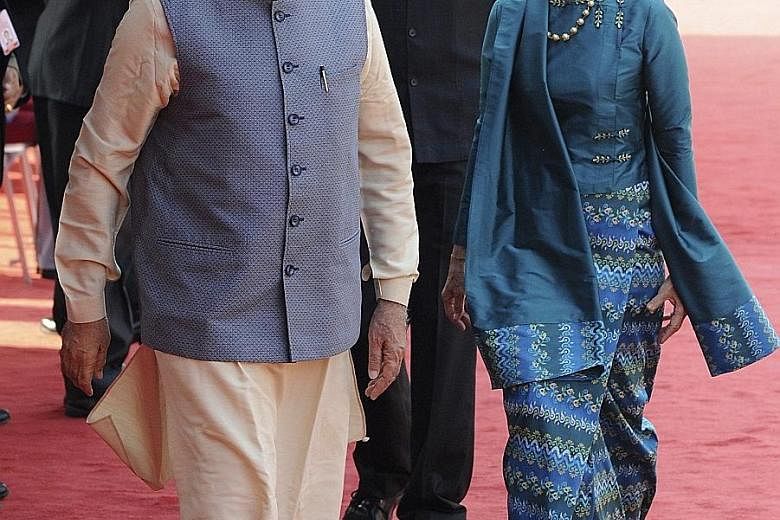Myanmar's Foreign Minister and State Counsellor Aung San Suu Kyi said she intends to "engage more closely" with India, as the two countries agree to step up cooperation in various areas, from energy to agriculture.
Ms Suu Kyi, who is on her first visit to India since her party National League for Democracy won the country's election last November, met Prime Minister Narendra Modi for talks yesterday amid an ongoing effort by India to woo Myanmar, a once closed society now opening up to the West and other countries.
India regards Myanmar, with which it shares a 1,643km-long border, as a bridge to the rest of South-east Asia, and is engaged in building a trilateral highway linking Myanmar and Thailand, as well as a port project.
"India has been most understanding of our needs and we believe that this understanding will only increase with time because it is our intention to engage more closely together, to depend on each other for our needs," said Ms Suu Kyi at a joint press conference with Mr Modi.
Amid ongoing violence in Muslim areas in Buddhist-majority Myanmar, Ms Suu Kyi also said her country wanted to learn from a democracy of diverse religions and ethnicities.
"We as a nation are struggling to make democratic culture take root in our country," she said.
Although the Nobel laureate had spent her formative years in school and college in India, she caused some heartburn by choosing China for her maiden foreign visit even though Myanmar President U Htin Kyaw picked India for his first overseas visit in August.
India was once a vocal supporter of Ms Suu Kyi but changed direction in the 1990s to build ties with the ruling junta amid the growing influence of China in the neighbourhood.
India is now keen to ramp up ties with Myanmar, which has oil and gas reserves, for energy and security purposes. India also needs Myanmar's help to continue protecting its border areas in the north-east where local insurgents have been carrying out attacks while sheltering in Myanmar.
Mr Modi yesterday assured Ms Suu Kyi that she had India's help and friendship.
"We have agreed that a close coordination to ensure security in the areas along our border, and sensitivity to each other's strategic interests, will serve the interests of both our countries," said Mr Modi.
New Delhi agreed to increase power supply to Myanmar, help train local police and develop an agricultural centre for seed production. The two countries also condemned terrorism in all its forms.
Experts see Ms Suu Kyi's visit as significant, but noted that she is unlikely to tilt towards India over China even though she has in the past described India as her "second home".
"It is a very important visit in the context of development of future relations between Myanmar and India," said Mr Ranjit Gupta, a retired diplomat and Distinguished Fellow at the Institute of Peace and Conflict Studies.
"But I think it would be wrong for Indians to expect any out-of-the- way favours from Myanmar. Her job is to look after Myanmar's national interests and not give preference to India over others."

